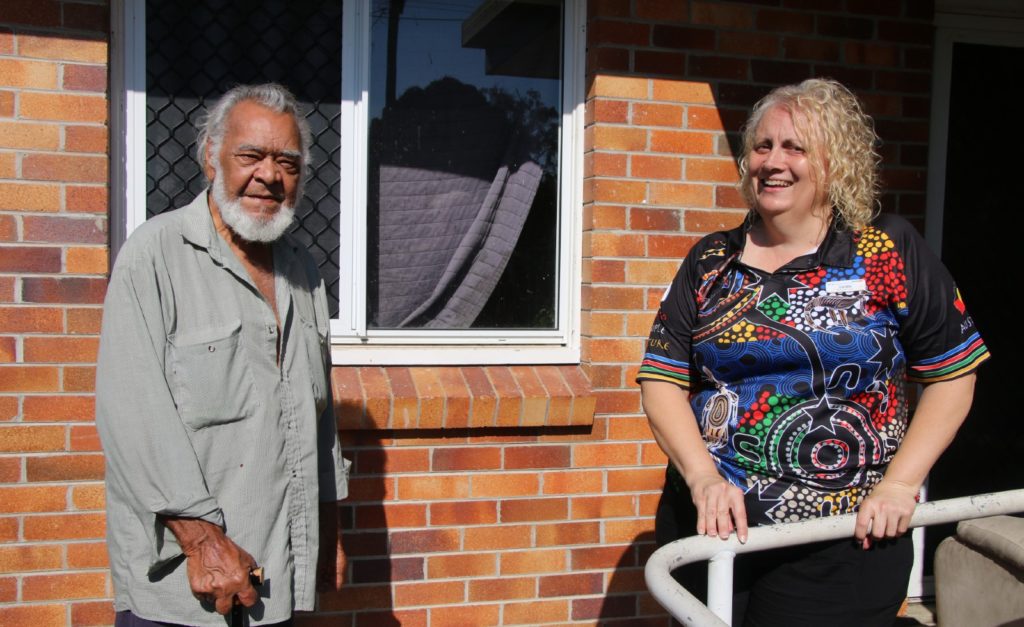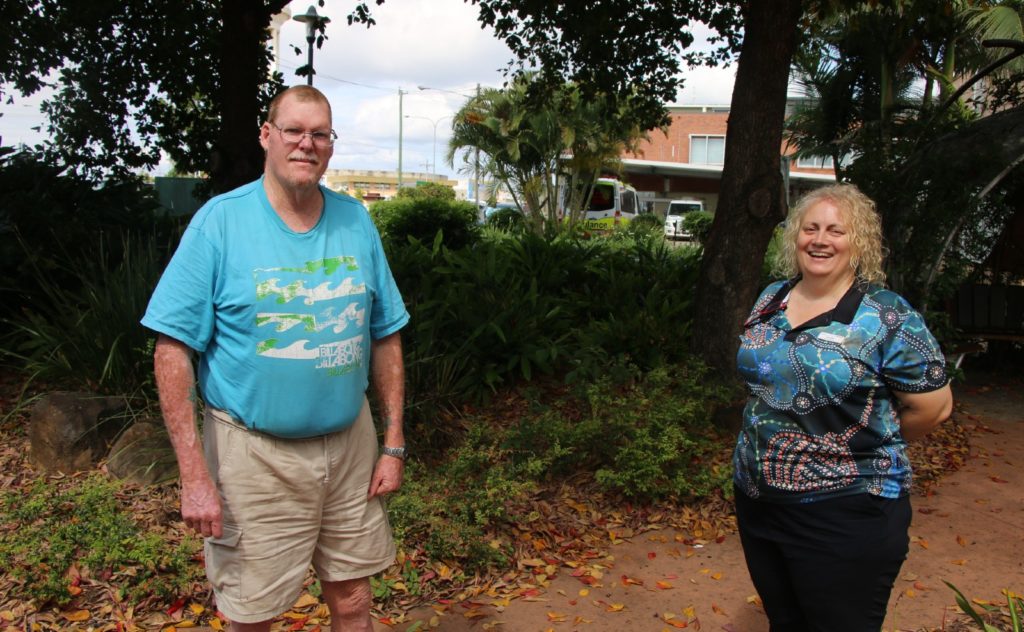
Employing a specialist Indigenous Nurse Navigator has improved health care and outcomes for local people in the Bundaberg Region.
Complications from diabetes left Moore Park Beach resident Gary Cameron with an infected wound on his foot, regular visits to the wound clinic every couple of days and facing the possibility of having his leg amputated below the knee.
Now Gary is heading back to work following help from Bundaberg-based Aboriginal and Torres Strait Islander Nurse Navigator Coralie Wheeler, who was able to collaborate with health providers and link him with appropriate support and care.
While the Nurse Navigator service has existed at Wide Bay Hospital and Health Service since 2017, it has expanded from an initial five navigators to 24 today, and includes a variety of new specialist care portfolios, including Aboriginal and Torres Strait Islander Health.
Gary was managing an existing diabetic ulcer on his toe when complications at the start of the year left him uncertain about his condition and treatment options.
“I had a hole all the way to the bone in the toe, but it had healed over time until January this year, when there were concerns about what may have been in the wound,” Gary said.
The infected wound and the loss of mobility meant Gary was facing the prospect of never returning to work as a heavy machinery operator and not being able to fully enjoy time with his grandchildren.
“The last thing I wanted to do was give up work, but it’s hard to drive an excavator with one foot,” Gary said.
“I didn’t know what options were out there. I would come in (for regular wound clinic appointments), do what I needed to do and get out.”

With the help of Coralie, Gary put in place an Aboriginal and Torres Strait Islander care plan that considered his long-term personal goals rather than focusing purely on clinical outcomes.
Now Gary only visits the hospital once a month, is enjoying a regular lifestyle and is transitioning back to work.
“Coralie has helped me with all sorts of stuff, not only at Bundaberg Hospital but also sorting out access to my super, NDIS paperwork, attending appointments with my GP, getting orthotics and specialist shoes, and accessing outside podiatrist appointments,” he said.
“I did end up having two of my toes amputated, but it’s a milestone getting back to work and it’s a relief how it has ended up. If I hadn’t done this, I could have lost a lot more than two toes.”
Coralie said Gary’s story was an example of how Aboriginal and Torres Strait Islander Nurse Navigators collaborated with clinicians and other services to ensure the most appropriate treatment and support was provided to patients and consumers.
“Aboriginal and Torres Strait Islander people just need someone they can trust, who knows their health story and supports them through their health journey,” she said.
“They need someone who won’t give up on them and can provide links between their often many health providers. Our Nurse Navigator role can do that.
“In this role, I have been working very closely with Integrated Wellness Centre (IWC) medical clinic staff, working together to achieve patient goals.”
Coralie is a nurse of 35 years experience, with a range of experience across various nursing areas including chronic disease and with Aboriginal and Torres Strait Islanders – both with the Primary Health Network in Bundaberg and with the Doomadgee community.
Local Taribelang Bunda Elder Uncle Raymond Broome praised the nurse navigators for being “angels of mercy” who listened to Aboriginal and Torres Strait Islander patients like himself and helped overcome the traditional issues his people had with health care.
“A nice hello and a friendly chat makes all the difference to me and to a lot of other people because we are a stubborn lot. To get that encouragement is a big thing,” Raymond said.
“A lot of us don’t want to find out what’s wrong, especially the older people. I had a lot of relations like that. There was not a lot of trust (in hospitals and doctors), but I think a lot of that is changing.
“Having Coralie visit my home was amazing. It picked me up a big bit, and I could ask questions. She breaks it down for me. What Coralie is doing is wonderful.”
WBHHS chief executive Debbie Carroll said a specialised nurse navigator advocating for Aboriginal and Torres Strait Islander people was an important step to ensuring they had better access to high-quality care that met their individual needs.
“Our partnership with Aboriginal and Torres Strait Islander Elders and community representatives clearly identified the need for a nurse navigator who could work with local First Nations people,” Ms Carroll said.
“They act as a central point of communication for the patient, reducing fragmentation between different areas and helping the patient understand different aspects of their care.
“Nurse navigators help their clients to develop a care plan that addresses their overall wellbeing needs and circumstances, while collaborating with other clinicians and support services from both within and outside WBHHS.
“By doing this, they can help Aboriginal and Torres Strait Islander consumers to achieve their health goals, return to a better quality of life and contribute to Closing the Gap.”




